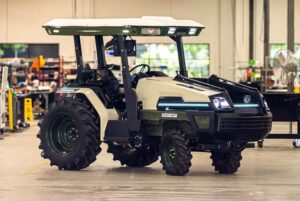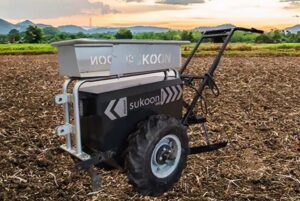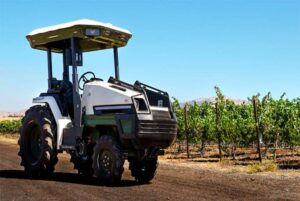In this era of technology-driven vehicles, electric vehicles (EVs) have integrated themselves into a lot of segments. EV Adoption in Agriculture has been steadily growing across various sectors, from personal transportation to public transit and delivery services. However, one industry that is increasingly embracing the electric revolution is agriculture.
Farmers are recognizing the benefits of switching from traditional gas-guzzling tractors and machinery to electric alternatives. This shift not only promises to revolutionize the agriculture sector but also has significant implications for the automotive industry.
Exploring the key drivers behind EV Adoption in Agriculture, we are going to dive deeper into its far-reaching impact on the automotive industry.
What Drives the Need for EV Adoption in Agriculture?
-
 Sustainability and Environmental Concerns
Sustainability and Environmental Concerns
One of the primary reasons behind the adoption of electric vehicles in agriculture is the growing concern for sustainability and environmental impact. Traditional agricultural machinery, powered by fossil fuels, contributes to air pollution, greenhouse gas emissions, and soil degradation. The shift to electric vehicles reduces the carbon footprint of farming operations, aligning with global efforts to combat climate change. Electric tractors and equipment produce zero tailpipe emissions, making them environmentally friendly choices for farmers, hence used as a perfect example of EV Adoption in Agriculture.
-
Cost Savings
Farmers are also motivated by the potential cost savings offered by electric vehicles. EVs have lower operating costs compared to their gasoline or diesel counterparts. Electricity is generally cheaper than fossil fuels, and electric vehicles require less maintenance due to fewer moving parts. This cost-efficiency is particularly appealing for smaller and mid-sized farms looking to optimize their budgets and improve profitability.
-
Government Incentives and Regulations
Many governments around the world are actively promoting the adoption of electric vehicles through incentives and regulations. Farmers can access subsidies, tax credits, and grants to offset the initial purchase cost of electric tractors and machinery. Additionally, some regions are implementing stricter emissions standards for agricultural equipment, incentivizing the shift to cleaner electric alternatives.
How is EV Adoption in Agriculture Transforming Automotive Segment?
 Expansion of the Electric Vehicle Market
Expansion of the Electric Vehicle Market
EV Adoption in Agriculture is also contributing greatly to the growth of the overall electric vehicle market. As more farmers invest in electric tractors and machinery, the demand for these specialized EVs increases. This, in turn, stimulates innovation and investment in electric vehicle technology, leading to a wider range of options for farmers and other industries. Electric vehicle manufacturers are now developing rugged and powerful EVs tailored to the specific needs of the agriculture sector, further expanding their product lines.
Battery Technology Advancements
The agriculture sector’s transition to electric vehicles is driving advancements in battery technology too. Electric tractors and machinery require powerful batteries capable of sustaining heavy-duty operations for extended periods. As farmers demand longer battery life and faster charging, research and development efforts in the automotive industry are focusing on improving battery technology. These advancements have a ripple effect, thus benefiting other electric vehicle segments, including passenger cars and commercial vehicles.
Supply Chain and Manufacturing Opportunities
The shift towards EV Adoption in Agriculture has created new opportunities in supply chain and manufacturing. Companies that specialize in producing electric vehicle components, such as batteries, motors, and control systems, are experiencing increased demand from the agricultural sector. This diversification of customers strengthens the supply chain and fosters innovation in electric vehicle manufacturing processes. Moreover, it enhances the resilience of the automotive industry by reducing its dependence on a single market segment.
Collaboration and Partnerships
To meet the unique demands of the agriculture sector, automotive manufacturers are increasingly collaborating with agricultural equipment manufacturers. These partnerships result in the development of purpose-built electric vehicles that are rugged, efficient, and reliable for farming operations. Such collaboration fosters cross-industry innovation and knowledge exchange, benefiting both the automotive and agriculture sectors and acting as a bridge for EV Adoption in Agriculture.
Demonstrating Viability
Another key feature of EV Adoption in Agriculture is that it serves as a real-world demonstration of the technology’s viability in demanding, off-road conditions. This showcases the potential of electric vehicles to other industries that rely on heavy machinery, such as construction and mining. As the agricultural sector successfully integrates electric vehicles into its operations, it paves the way for broader acceptance and adoption in diverse industrial sectors.
Challenges and Considerations
 While EV Adoption in Agriculture offers numerous advantages, there are also some notable challenges to address include:
While EV Adoption in Agriculture offers numerous advantages, there are also some notable challenges to address include:
Infrastructure: Rural areas where many farms are located may lack the necessary charging infrastructure for electric vehicles. Expanding charging networks in agricultural regions is essential to support widespread adoption.
Initial Costs: Electric tractors and machinery can have a higher upfront cost compared to their conventional counterparts. While government incentives help, affordability remains a concern for some farmers.
Range and Battery Life: Electric vehicles in agriculture must be capable of operating for extended hours and covering large areas. Improving battery range and longevity is crucial to meet these demands.
Wrapping Up
EV Adoption in Agriculture represents a significant shift in the industry, driven by sustainability concerns, cost savings, and government incentives. This transition not only benefits the agriculture sector but also has far-reaching implications for the automotive industry. It promotes the expansion of the electric vehicle market, drives battery technology advancements, creates new supply chain opportunities, fosters collaboration between industries, and demonstrates the viability of electric vehicles in challenging conditions.
As electric vehicles continue to prove their worth on the farm, their influence on the automotive industry is set to grow, leading to a more sustainable and innovative future for both sectors.


